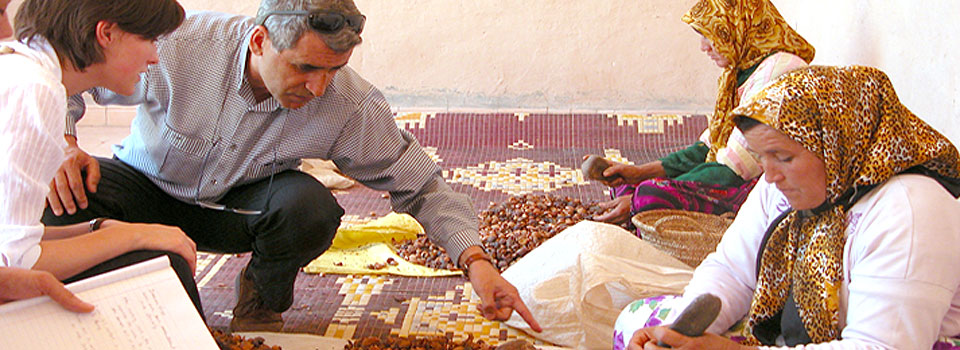Battered, divorced and unwed pregnant women struggling to make a living in Morocco found unlikely allies in William Kisaalita and his UGA engineering students. They formed a partnership that could help improve the economic outlook of the women’s futures while respecting their religious and cultural traditions.
In southwestern Morocco, where community and family gender roles are distinct and strictly observed, women have formed cooperatives — some specifically employing women lacking financial and emotional support — that produce small quantities of high-quality oil from Argan tree nuts, said Kisaalita, an engineering professor with the UGA College of Agricultural and Environmental Sciences. The women sell the oil, which is important to the Moroccan economy because of its valuable culinary, cosmetic and medical uses.
“These women perform the most tedious and time-consuming tasks of [gathering the nuts from the forest, drying them, and] cracking them by hand,” Kisaalita said. The kernels are then separated from the broken shell pieces and pressed to yield the oil.
“Argan nuts have extremely hard shells,” he said. “In some instances, it takes three stone strikes to retrieve the kernel. The women are paid by the weight of the shelled kernels they produce each day.”
Although machines could make the cracking easier, faster and safer, the women oppose the idea, fearing they may lose their jobs to the more efficient and cheaper labor machines could provide. So Kisaalita sought a culturally sensitive solution that would both strengthen the output of the co-ops and preserve the socioeconomic security the nut-cracking provides the women and their families.
He traveled to Morocco to establish local contacts and learn about the Argan oil production process firsthand. Then he gave his UGA students the problem: find a way to help the women produce more shelled kernels per day without using technology that could eliminate the need for their manual labor.
The students tested the strength of the Argan nuts before helping to design a hand-operated nut-cracking device that Kisaalita built and tested. The project also taught them the importance of solving problems while respecting local culture.
The device costs less than $100 to make – a fifth of what the women currently earn in a year, Kisaalita said.
“Further modifications [of the prototype] are needed,” he said. “Funding is being sought to fabricate and test the third generation [and get it] in the hands of the target users in Morocco. We’re confident [that this device] will empower women by improving their socioeconomic situation and quality of life.”
Throughout his UGA career, Kisaalita has merged his research interests in biological and agricultural engineering with his commitment to actively encourage students to apply what they learn in the classroom to real-world problems. His philosophy of intertwining teaching, research and service recently led to bestowing him with UGA’s inaugural Scholarship of Engagement Award. The Award honors a tenured associate or full professor who has made significant contributions toward identifying or addressing issues of public concern and whose work advances civic engagement through scholarship and service-learning opportunities for students.
Original story appeared in the Summer 2007 issue of Outreach magazine
